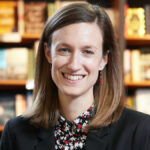Re-forming habits takes time and patience – even for reading, says Holly Ainley, Book Buyer and Manager of Jarrold Books in Norwich. Here, she reflects on how physical restrictions have seen an emergence of new freedoms in what, where, how and why she reads.
One of the pleasures of reading is that there is no wrong or right way to do it; we each have our own, often long-held reading habits. But under lockdown restrictions, many such things we might normally do at home without thinking, have taken on new patterns and significance. When it comes to reading, for me the recent weeks have yielded an unexpectedly welcome shift: the restriction on my physical movement has seen an emergence of new freedoms in how I read.
There are some practical reasons why things have altered, like the fact I am not working and increasingly find time more elastic; I can read at previously unavailable moments of the day, like right after breakfast when I’d normally be dashing to my desk, or mid-afternoon when I’d be battling my inbox. Naturally, being able to isn’t the same as actually doing so and I was frustrated in those early days of lockdown and furlough to find that the effect of all this time and space was initially close to a reading paralysis. Surely the opportunity for uninterrupted reading was what I’d always wanted? But this sudden expanse of time felt fraught, uncertain, unfamiliar. Re-forming habits takes time and patience even when you’re the one driving the change, but this all happened so fast; my reading brain hadn’t caught up and was overshadowed by more fundamental concerns.
I was frustrated in those early days to find that the effect of all this time and space was initially close to a reading paralysis
Poetry helped move past this, as little by little, reading random poems that focused on universal truths and the power of connection – from Kathleen Jamie’s ‘Lochan‘, to Bertolt Brecht’s ‘Pleasures‘ to Mary Oliver’s ‘Wild Geese‘ – brought solace and restored my concentration. The first book I managed to read cover to cover was a surprise: Black Beauty by Anna Sewell, for a book club. It was also a relief. Something about the story’s simple message of treating horses, but also one another, kindly and empathetically, coupled with the safety of it being a ‘children’s’ book (how much could it ask of me and of my attention?) helped me get back in the proverbial saddle, reading-wise.
Where I read has changed too. Previously the reserve of bed and sofa, I now find myself chasing the light (and sometimes the sunshine) around the house, starting in the front bay window for precious early hours, reappearing at the back after a brief spell in the otherwise shady garden: a chair strategically positioned at each point. The effect is that rather than hunkering down for the long haul with a book like usual, there is a new, refreshing sense of movement and spaciousness about my reading. Perhaps the streamlined, more essential way we have been asked to live means I have shed the compulsion to finish something in one sitting for fear I might not get the time or the headspace to return to it. Again, far greater, more tangible concerns outside have rendered my internal ones less essential and encouraged me to trust in the benefits of new patterns.
there is a new, refreshing sense of movement and spaciousness about my reading
A shift in the why and how of my reading habits has been the most interesting liberation. Normally I have a working life, one that is immersed in books – the buying, selling, presenting, discussing and celebrating of them – and the order of my to-read pile tends to be dictated, necessarily, by work commitments. While there is great enjoyment to be had whichever way I read, it seems that the lowering of external expectations has plunged me into a more instinctive, genuinely passionate way of moving from book to book. My current route began with Rebecca Solnit, a revisit to Virginia Woolf, punctuated by Muriel Spark’s poetry and collected essays on Peggy Guggenheim, by way of fiction from Bernadine Evaristo and Garth Greenwell with a short stop-off for Grayson Perry. Free to roam with no constraints, every book suddenly carries equal weight and choosing my own way between them holds quiet satisfaction, an experience that for me, often must take second place.
They say it takes an average of 66 days for a new habit to become automatic. While the duration is out of my control in this instance, noticing the benefits of a change, however brief, to long-held reading patterns is within my gift. By sharing it, maybe it might prompt another reader to celebrate their own quiet revelations. One habit I’ll never change? Having more books than I’ll ever need.

Holly Ainley is the manager and buyer for Jarrold book department and programmer for the store’s literary events. She began her career as a bookseller in Brighton, going on to train as a literary scout for numerous foreign publishers, before becoming an editor of literary fiction at independent publisher Myriad Editions and later commissioning for The Borough Press at HarperCollins. She has also worked as Marketing Manager for poetry publisher Nine Arches Press and contributed to the Open University’s Creative Writing MA syllabus, speaking on editing and publishing. Holly is the reviewer for BBC Radio Norfolk’s monthly book club. She lives in Norwich. @hollyainley
This article was commissioned as part of City of Literature 2020 – a series of conversations, reflections and connections across one week in May. Presented by the National Centre for Writing and Norfolk & Norwich Festival.

